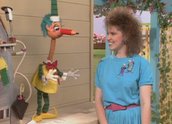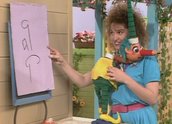

Mr Squiggle and Friends – Cheer Up (1990)
Synopsis
The episode opens with Reg (Mikel Robins) and Bill Steamshovel (Norman Hetherington) discussing rain, which would make Gus the Snail happy but Bill unhappy (because he rusts). They then cheer each other up with some riddles. Rebecca (Hetherington) prepares a tea party, then Rocket and Mr Squiggle arrive, joined by the singing and dancing Blackboard, for some squiggles. Gus introduces the ‘Song for Today’ and, after a song and animation, and with afternoon tea over, it’s time for just a few last squiggles before Mr Squiggle returns home to 92 Crater Crescent, The Moon.
Curator’s notes
Mr Squiggle and Friends underwent a number of format and duration changes during its 40-year history while the core characters and content remained the same. This version, recorded in 1990, runs for 25 minutes and is made up of regular segments. These include riddles with Bill Steamshovel and guest, the arrival of Rocket and Mr Squiggle and the transformation of viewers’ squiggles with Mr Squiggle’s pencil nose and the help of a singing and dancing Blackboard and ‘friend’ Rebecca. There is also a daily song, and animation seen through the device of ‘Gus TV’, a television shell belonging to Gus the Snail.
Squiggle’s helper here is Rebecca Hetherington, Norman and Margaret’s daughter and the show’s sixth presenter. Other presenters included Miss Gina (Curtis) followed by Miss Pat (Lovell) who assisted Mr Squiggle for 15 years from 1960 (see Mr Squiggle and Friends – Episode 148, c1960), then Miss Jane (Fennell), and Roxanne (Kimmorley). Norman remembers Mr Squiggle instinctively relating in a different way depending on the personality of his helpers: ‘Miss Pat was more of a school mistress and Miss Jane was more of the big sister and Rebecca was more like the girl next door or playmate.’ However each of them played their part by holding his hand, helping to guess what the squiggles had become and involving the audience at home.
Mr Squiggle and Friends has always been truly a family affair with Norman’s wife, Margaret, having written all the scripts and played a large part in character development. Themes of making people feel good, afternoon tea parties and plans for a ‘Year of the Snail’ are woven through the episode with much of the dialogue ad libbed.
When asked recently about what Mr Squiggle might make of modern children’s television Norman responded ‘I don’t quite know. I think he thinks it’s all very wonderful, but it’s a different world. He lives in the backblocks of the moon, and he’s quite happy to be old-fashioned instead of hyped up special effects … Our grandchildren sort of identify with him very much, and they much prefer the gentle friendly non-confrontational sort of feel.’
Margaret puts the enduring success of the character and program down to the fact that ‘it’s possibly just that we like kids and maybe that comes across.’ Norman adds that, unlike many of his other shows which were workshopped, often with neighbourhood children present, ‘Squiggle was more impromptu, you know, he happened sort of on the run almost at times’ and Margaret agrees: ‘Oh lordy yes! Yes very much on the run sometimes. But still I think one of the great advantages of working with children is that it’s much simpler in many ways because they’re going to take what you give them as it’s meant. They’re not going to look for all the back story and this and that and the other and all the innuendoes – it’s simple in that sense, which is good.’ For the record Margaret also comments that in its entire history there was only been one case of script censorship with a producer picking up an unintended innuendo.
In summary, Norman comments that ‘We treated it as fun. People ask what age group are you aiming it at … well we don’t aim it anywhere, we just have fun.’ Margaret adds ‘Yes … I think basically if you are writing for kids you remember back to what you liked as a kid and that’s what it’s all about.’
This episode was broadcast on the Australian Broadcasting Corporation in 1990. Mr Squiggle and Friends first went to air on 1 July 1959. It continued to be recorded until 1999 and broadcast in various formats until 2003.
- Overview
- Curator’s notes
- Video 2 clips
- Principal credits
- Find a copy
- Make a comment
- Add your review



